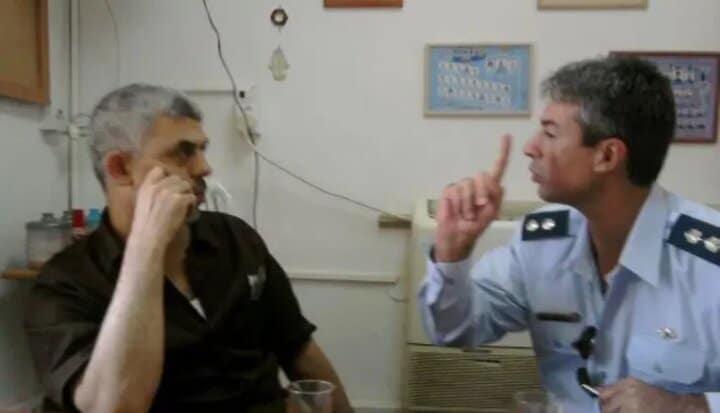Doctor Who Opposed Yahya al-Sinwar’s Release Reveals Chilling Insights into Hamas’ Leader’s Personality.
According to Arabic News 21, a dentist and former intelligence officer of the Zionist regime, who was familiar with prisoner number 7333335 named Yahya al-Sinwar, who was imprisoned in prison from 1989 to 2011, a long time ago. brought up
Beaton, who was a senior officer of the Zionist Intelligence Service, spent long hours talking to Al-Sinwar and analyzing his personality. He claims that he is well aware of Sinwar’s views and thoughts and knows him better than any other Israeli person and knows that the price that the Israelis have to pay for the release of their captives will definitely not be favorable to Israel.
According to this report, in one of his interviews, Sinwar told an Italian journalist: prison makes a person and gives him enough time to think about his beliefs.
Sinwar was arrested in 1989 when he was only 27 years old. He tried to escape from the prisons of the Zionist regime many times, and he communicated with Hamas leaders outside the prison many times, and he knew how to bring a cell phone into the prison. He knew how to use lawyers and visitors to get his messages out of prison. Many of these messages were about how to kidnap Zionist soldiers to exchange them for prisoners.
Determination in prison
According to the report, he was fluent in Hebrew and pursued his education through online courses. He always followed the news of Israel in order to get the best information about the internal situation of the occupied territories.
Beaton says that Sinwar would pass out pages of his translations of Israeli books to other prisoners so that they could learn about the intelligence agencies’ tactics in fighting their enemies. He used to say to the prisoners with him: They want to turn the prison into our graves and break our determination and willpower along with our bodies, but thank God we believe in the cause of Palestine and that is why we turned the prison into a place for worship and education. We convert different sciences.
Peace and gratitude
Beaton, who used to go to the prisons of the Zionist regime to stitch the wounds of the prisoners and give them general treatment, had tried many times to convince Senwar and other Palestinian soldiers to cooperate with the Israeli interrogators. He says that Sanwar was suffering from pain in the back of his neck at that time and probably had a brain injury and needed to be taken to the hospital immediately.
Beeton visited Senwar a few days after his surgery and Senwar thanked him. He wanted to explain to Beaton how in Islam they thank someone who saved his life. It was also interesting for Beaton to know the importance of this point among Muslims.
Beaton was a talkative character and engaged in conversation with many of the Palestinian prisoners, talking to them about their families or the sports they were interested in. He had regular meetings with Sanwar, but he always corrected him about his work and his religious views.
Beaton says: My conversations with Sinwar were not personal or emotional. He had memorized the Quran well and spoke calmly about the principles governing his organization.
During the inspection of the prison in 2004, writings in Sinwar’s handwriting were found that talked about the relationship between men and women and the family in Islam, and at least one copy of it was transferred outside the prison.
Exemplary humility in prison
Beaton says that in Beersheba prison, Sinwar was undoubtedly the leader of the prisoners, but he never expressed this fact and was not proud of it. He was very humble and shared his food with others and helped young prisoners with prison work.
This Zionist doctor makes Sinwar a very smart and clever person, and at the same time, a deceiver who has the power to attract many people. Even inside the prison, he kept other people’s secrets and at the same time was honest in his interactions with others.
After the captivity of Gilad Shalit, a Zionist soldier, and while the Israeli cabinet used its connections to advance the prisoner exchange negotiations, Bitton was tasked with using his connections with the imprisoned Hamas commanders to gather intelligence from them. He says that Sinwar managed the negotiations from inside the prison along with some of his friends who were by his side.
A doctor who was against Sinwar’s release
German Intelligence Service officer Gerhard Konrad, who was one of the mediators of this exchange, says that although Sinwar’s name was on the exchange list, he believed that the exchange was not sufficiently beneficial to Hamas and that all the prisoners should be released.
Beaton says that when Sinwar was supposed to be released in the prisoner exchange operation, he suggested that Sinwar should not be released due to his character. But the Zionists have told him that his hands are not stained with the blood of Israelis and there is no problem for his release. Beaton, however, believed that the release of Palestinian prisoners should be done according to their ability to attract various anti-Israeli potentials, not based on the actions they have taken before.
Beaton says that even when he was released from prison and while riding the prisoner bus, Sinwar said that he would not hesitate to make any effort to free other Palestinian prisoners. He said that he will ask the Qassam battalions to arrest more Zionist soldiers in order to set the stage for the release of other Palestinian prisoners.

